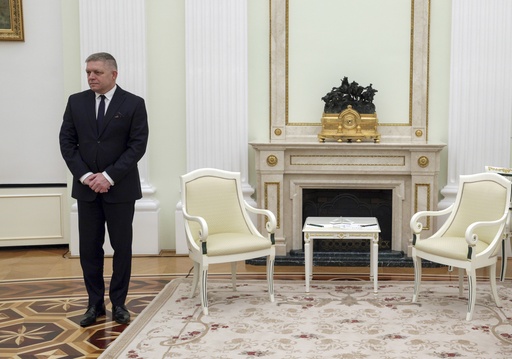
Russian President Vladimir Putin welcomed Slovakia’s Prime Minister Robert Fico to the Kremlin on Sunday, marking one of the few visits by a leader from the European Union to Russia since the onset of the country’s full-scale invasion of Ukraine in February 2022.
Fico’s trip was described as a “working visit” and included a private meeting with Putin in the evening, according to Kremlin spokesperson Dmitry Peskov, who shared details with a Russian news agency. The discussions were anticipated to cover topics like “the international situation” alongside the ongoing supply of Russian natural gas.
Despite ongoing tensions, Russian natural gas continues to be transported to several European nations, including Slovakia, through Ukraine. This is enabled by a five-year contract established prior to the conflict, which is set to terminate at the end of this year. During a recent summit in Brussels, Ukrainian President Volodymyr Zelenskyy informed EU leaders that Ukraine has no plans to renew this agreement, a stance that Fico argued would be detrimental to Slovakia’s energy needs.
Following his discussions with Putin, Fico took to Facebook to communicate that he had briefed European Union leaders about his visit. He emphasized that his Moscow talks were influenced by comments made by Zelenskyy, who opposed any gas transit arrangements via Ukraine. Additionally, Fico highlighted Zelenskyy’s support for imposing sanctions on Russia’s nuclear initiatives, which he deemed unacceptable, given Slovakia’s dependence on nuclear energy.
During their meeting, Fico reported that Putin assured him of Russia’s willingness to maintain gas deliveries to Western countries. They also addressed the military conflict in Ukraine, exploring avenues for a peaceful resolution as well as discussing the bilateral ties between Slovakia and Russia, with aspirations to “standardize” their relationship.
Fico’s visit, however, faced backlash from significant opposition parties in Slovakia. In anticipation of a potential disruption to Russian gas supplies via Ukraine, Slovakia finalized a short-term contract to import natural gas from Azerbaijan last month. Earlier this year, the country also secured a deal for U.S. liquefied natural gas through a pipeline from Poland.
Slovakia has additional options for gas imports through Austrian, Hungarian, and Czech networks, which could facilitate imports from Germany and other suppliers as necessary. Visits to Putin from European leaders have become increasingly scarce following the invasion of Ukraine, although Hungary’s Viktor Orbán and Austria’s Karl Nehammer did travel to Moscow in the past year, drawing criticism from Ukraine and other EU officials.
Orbán, noted for his close ties with Putin among EU counterparts, has frequently obstructed European efforts to provide assistance to Ukraine and impose sanctions on Russia. He has consistently advocated for a cessation of hostilities, though without clarifying the implications for Ukraine’s territorial integrity or security.
Fico’s stance on the situation in Ukraine notably contrasts with that of many other European officials. Reassuming power last year with his leftist party Smer (Direction), he ran on a platform of pro-Russian and anti-American sentiment. Since taking office, he has halted military support for Ukraine, criticized EU sanctions on Russia, and opposed Ukraine’s potential NATO membership.
Fico has also been among the rare senior EU politicians to feature on Russian state television since the invasion. In an October interview with Rossiya-1, he claimed that Western support for Ukraine has prolonged the conflict and argued that sanctions have proven ineffective. He expressed his willingness to negotiate with Putin.
Additionally, Fico announced plans to attend next year’s military parade in Moscow, commemorating the 80th anniversary of Nazi Germany’s defeat in World War II. This annual event, also known as “Victory Day,” has been utilized by the Kremlin to showcase military accomplishments, with Putin labeling Russian soldiers in Ukraine as “heroes” during this year’s celebration.

